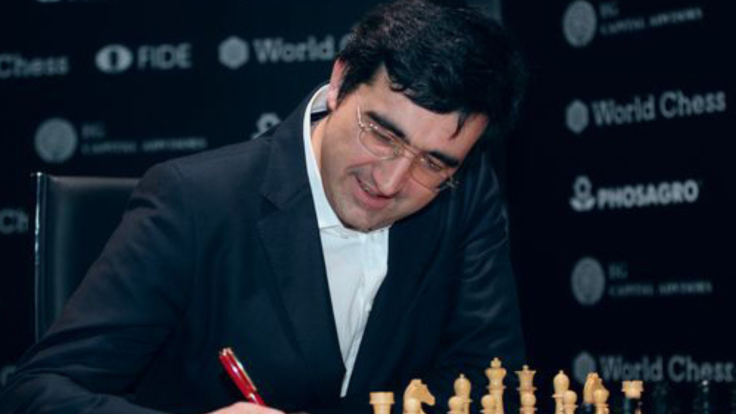Is Vladimir Kramnik To Blame? Sad Truth Behind His 'Neverending Attacks' on Daniel Naroditsky
Here's how the feud between the two started

Former World Chess Champion Vladimir Kramnik is facing backlash once again after American grandmaster Daniel Naroditsky's sudden death shocked the global chess community. Kramnik, known for his outspoken views on cheating, had repeatedly questioned Naroditsky's integrity before the tragic news emerged.
His public comments, including his latest posts made just days before Naroditsky's passing in October 2025, have reignited debate over how far online criticism should go. Many fans now wonder if Kramnik's relentless remarks may have crossed a moral line.
Did Kramnik Bully Naroditsky?
In October 2024, Kramnik openly accused Naroditsky of suspicious play, as per Sports Now. He proposed a $100,000 (£74,721.50) head-to-head match, saying, 'Ok, was enough time to answer my proposal... Since no answer is the answer, let's close this story and I will be publishing statistics of Danya and others instead, explaining my concerns.'
The death of Daniel Naroditsky was caused by the neverending attacks on him by Vladimir Kramnik. Don't ever let this scumbag bully anyone ever again @VBkramnik
— Daniel (@Fokum9) October 20, 2025
After no response from Naroditsky, Kramnik published data analysis suggesting a sudden spike in high-level game performance. He claimed his team had developed a tool to identify unusual patterns and hinted that Naroditsky's success rate raised questions.
Naroditsky publicly hit back, calling Kramnik 'worse than dirt'. Their dispute became one of the most heated topics in online chess, dividing players and fans. Kramnik insisted he was only promoting fair play, while others saw his posts as harassment.
Kramnik–Naroditsky Feud Explained
The feud began in late 2023 when Kramnik started questioning the legitimacy of online results. By October 2024, his focus turned to Naroditsky. Over the following months, Kramnik repeatedly shared statistics, screenshots, and commentary hinting at misconduct.
The conflict escalated further when Kramnik continued his online commentary throughout 2025. On 18 and 19 October 2025, just days before Naroditsky's reported death, Kramnik posted again on X (formerly Twitter).
Seemingly, conflicts with @chesscom, @freestylechess1, both kicking him out from commentator role,had a big impact lately on @GmNaroditsky. Got the stream episodes. Not a doctor but looks like something "very else" than sleeping pills. Hope,if any, real friends of him will care
— Vladimir Kramnik (@VBkramnik) October 20, 2025
He reposted a lighthearted comment from Indian grandmaster Vidit Gujrathi, followed by a remark about modern chess: 'Sanity of nowadays chess. Proctor control but headphones allowed. That makes any other measure including proctor apriori meaningless. Growing the game.'
The next day, he made another cryptic post: 'Normally they don't 'clean' in such a rush (although erasing materials from internet is 'their' trademark, not on web means never happened), must be something quite interesting I think.'
What exactly happened? Because I received this two days ago from a friend of mine chess fan, and at least did what I could to warn people to do something urgently in my posts. To those who prefer blaming and shaming instead of helping. Awfull tradegy, hope properly investigated pic.twitter.com/12xz9oZNx4
— Vladimir Kramnik (@VBkramnik) October 20, 2025
Many fans viewed this as another dig related to his earlier feud with Naroditsky. These posts, made shortly before the American grandmaster's death, have drawn renewed criticism for their timing and tone.
Who is Vladimir Kramnik?
Vladimir Kramnik, born in Russia in 1975, became World Chess Champion in 2000 after defeating Garry Kasparov. He held the title until 2007 and is regarded as one of the greatest classical players of his era.
Since retiring from competition in 2019, Kramnik has remained active as a commentator and analyst. His recent years, however, have been marked by controversy due to his vocal campaign against cheating in online chess. His influence and following have made every statement he posts carry significant weight.
Fans Blame Kramnik for Naroditsky's Death
After Naroditsky's death in October 2025, grief quickly turned into anger online. Fans accused Kramnik of fuelling public humiliation through his repeated posts and harsh tone.
One user wrote: 'Vladimir Kramnik championed a false narrative and caused persistent infliction on late GM Daniel Naroditsky.' Another said, 'The death of Daniel Naroditsky was caused by the never-ending attacks on him by Vladimir Kramnik.'
Vladimir Kramnik championed a false narrative and caused persistent infliction on late GM Daniel Naroditsky.
— 𝑈𝑟𝑜𝑚𝑖 𝐵𝑜𝑦 (@Anthony1Enahoro) October 21, 2025
Kramnik was actually cyberstalking Danya and didn't care about his mental health.pic.twitter.com/0MGRIEzsEf
Several grandmasters, including Hikaru Nakamura, openly condemned Kramnik's actions, calling them cruel and unnecessary.
However, there is no confirmed link between Kramnik's remarks and Naroditsky's death. Reports so far contain no verified medical or mental health details.
Hikaru has strong words for Kramnik in the wake of Daniel Naroditsky’s passing
— yeet (@Awk20000) October 20, 2025
“I said it before, I’ll say it again..he can go F himself”
pic.twitter.com/wGTbLdEB07
What remains clear is that the chess world has been left divided — some defending Kramnik's right to voice concerns, others accusing him of moral responsibility.
The tragedy has now prompted broader reflection on how online criticism can inflict real-world harm, especially within such a close-knit global community.
© Copyright IBTimes 2025. All rights reserved.




















